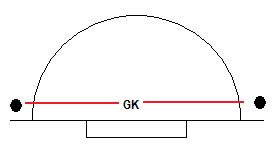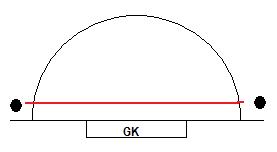Whilst shot stopping is an essential part of the goalkeeping role, there is more to it than just that! Goalkeepers can often be quiet personalities (that’s not to say there aren’t eccentric or outward going members of the goalies’ union i.e. Bryzgalov of the Philadelphia Flyers; wrong sport but a good example!) and as such, can often be content with simply reacting to the game as it develops rather than orchestrating their defence. However, by organising the defence, the goalkeeper can quickly identify areas of attack, helping their team to play to a higher level. By taking command of their team and relaying instructions or pointing out unseen attackers who have managed to get in front of them (for example!), they show they are confident in their ability to read the game and take charge of the situation
Best view on the pitch
The goalkeeper arguably has the best view on the pitch. They can observe the game as it unfolds, reading the play to work out potential dangers and points of attack that could lead to scoring opportunities. With this significant advantage, the goalkeeper can use it to help their team out, identifying these dangers and telling them of them. If you were playing in defence, wouldn’t you want someone helping you out with advice on where the dangers are?! The more you help your team out, the more confident they will be with you in goal, knowing they can trust you to provide them with the support they need. Engaging in dialogue with their defence lets them know they are being helped.
Reading the play
Reading the play is an elite skill that helps you respond to changes in the game but needs analysing in more detail (so hopefully I’ll get round to writing an article on that at some point!). It is more obvious for a field player when making interceptions during a break in play, but for a goalkeeper, they need to be aware of all that’s going on in front of them. Watching games in person or video footage of games will help you learn to read the game as it happens in front of your eyes. Reading the play and being constantly aware of goal scoring opportunities will help you in being vocal; knowing what to say and when.
The silent goalie
The case of the silent goalkeeper is one that goalkeepers shouldn’t aspire to, but is a fairly common occurrence! For all their technical ability at stopping shots, their inability to be a commanding presence for their team hampers their chances of greater success. Whilst trying to tally up your success rate against a lot of shots, a better goalkeeper is one who looks to limit scoring opportunities by constantly feeding their team information. A silent goalie is more likely to face more shots and scoring opportunities because they are not commanding the game in front of them. A game involves team effort and by barking out orders, you are showing that you want to be part of the team and want to help them out.
Being involved in the game also helps with concentration. With this maintenance of your concentration levels, you stand a better chance of making the save when it matters. By being in tune with the game and not dropping off to sleep (which is an extreme but makes the point!) will also help you stay sharp and be able to make the save when an opportunity on goal occurs.
A vocal presence
The best weapon (if that’s a suitable phrase!) against the attacks of the opponents, is actually your voice. Aside from pointing by gesticulation (i.e. waving your stick in the direction of free attackers), the best chance you have of communicating with your team is obviously to talk to them. Watching international goalkeepers in action will show you the use and importance of the skill of being in dialogue with your team. James Fair (GB and England international) is a good example of a goalkeeper who creates a dominant presence with his voice, constantly barking out instructions to his team as he identifies goal scoring opportunities early on and tells his defence about them.
In the heat of playing a game and being on edge and nervous, it can be easy to forget the need to be vocal. When I was being coached as a deputy to an elite level goalkeeper, I was told that your defence often want to simply hear the sound of your voice so they know you are still there! Whilst you don’t want to slip into the trap of providing useless information, you still need to be constantly barking out orders as and when you see a breakdown in defence. The more involved you are, the more your defence and team can structure themselves towards each occurring threat.
When you notice an urgent need for your defence to react, you need to vocalise it. Here are some potential areas where you can be vocal:
- Pointing out unmarked defenders who are in the D
- Instructions for defenders (e.g. which side the attacker is trying to move them to)
- Identifying attackers running in
- Marking up against a team
- Getting back quickly after a short corner in the opposing end
Be heard!
It’s difficult to be heard during a game, but you need to work on it and stick it out to help you develop your goalkeeping skills. The phrase “be heard by the other goalkeeper” is often used in coaching terms when describing the need to be loud. Essentially you need to be as loud as you can, potentially being heard from the other side of the pitch! Practise helps and learning to shout and raise your voice will obviously help (but be careful where you do it!). When I was learning the importance of shouting, I had to be heard over aeroplanes (with the pitch near an airport obviously!)!
Be in charge!
Ultimately, whilst it’s not always easy, the goalkeeper has to take it upon themselves to command their team. Shot stopping abilities only get you so far. The more you engage with the game, the more you show your team you are able to read the game and provide them with useful pointers to threats they need to deal with. By being a vocal presence, you will see an improvement in your concentration and the way you can reduce scoring opportunities.

